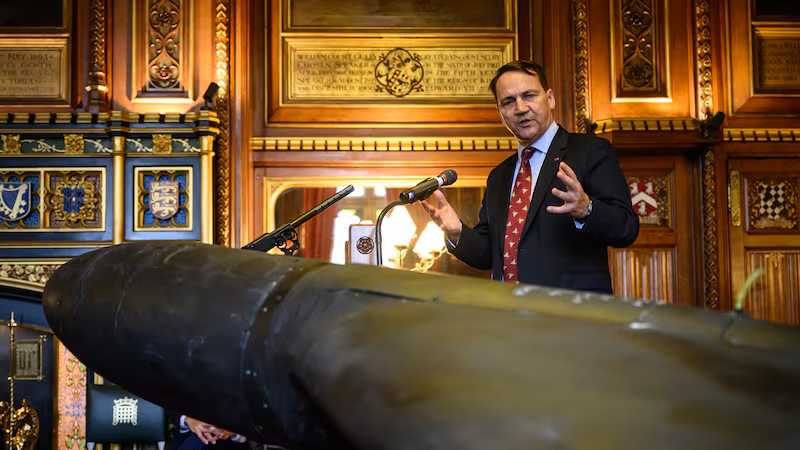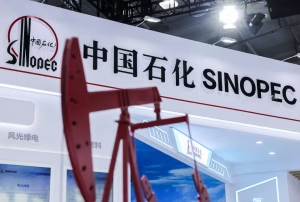Poland’s Foreign Minister Radek Sikorski has called for stronger maritime law to end the illicit shipping of Iranian and Russian oil that is fuelling the war in Ukraine.
Their movement off-radar poses huge security and environmental risks, Mr Sikorski said during a visit to London. There are also concerns about about 300 Iranian vessels shipping oil to bypass sanctions and support Russia.
The ships turn off their transponders to move undetected in commercial shipping routes, increasing the risk of collisions. Nato mobilised forces to protect the seabed and critical infrastructure in the Baltic Sea from sabotage in January, and multiple networks have been sanctioned by the US and EU.
Mr Sikorski said: “We are far too lax to have this traffic at sea. It is no good to have this anarchy. I’m hoping that London, which is the seat of the International Maritime Organisation, will look at this.”
Referring to an oil spill in the Azov Sea last December caused by a collision of Russian tankers, he said: “If something like that happened in the Baltic, we would have a major environmental disaster. The Law of the Sea needs to be amended for us to be able to prevent such disasters.”
Synchronised sanctions
New sanctions targeting companies and fleets enabling the flow of Russian oil into global markets were announced by the UK on Wednesday.
Russia’s two largest oil companies, Rosneft and Lukoil, were among the 90 entities targeted, as well as four oil terminals in China, 44 shadow fleet tankers and oil-refining company Nayara Energy, based in India.
UK Chancellor Rachel Reeves said the sanctions were a “clear signal” that “Russian oil was off the market”.
About 450 Russian-owned ships, their captains and crew members have been sanctioned by the EU for illegally shipping fuel or sabotage.
The reimposition of UN sanctions on Iran this month by the EU will also prohibit engagement with Iranian vessels. The US sanctioned a further 40 vessels and captains linked to shipping Iranian fuel last week. But Mr Sikorski said the list of EU-sanctioned fleets is “not synchronised” with the US’s list.
Asked by The National whether he was satisfied that the sanctions snapback could effectively curb Iran’s cooperation with Russia, Mr Sikorski said: “It is difficult to predict how Iran will react. It would have been in the interest of Iran to have a peaceful nuclear programme with enrichment done somewhere else, and it could have saved itself a lot of unpleasantness in the meantime.”
Many of the Iranian vessels were being tracked despite being off-radar, said ambassador Mark Wallace, chairman of United Against Nuclear Iran.
“They’re not in the shadows. We know where they are, and we have to have a unified front in sanctioning them and making sure that these captains and crew are brought to justice,” he said. “That oil is funding the horrible behaviour by Iran to destabilise the region and is funding the Russian war machine.”

Iran drone threat
It comes as the US considers supplying Ukraine with Tomahawk missiles to counter the threat of Iranian-designed drones that have been raining down on Ukrainian cities.
Up to 23 drones thought to be Russian entered Polish airspace in September before being shot down.
Defence ministers are meeting at Nato headquarters in Brussels to pledge increased defence spending on Ukraine on Wednesday. The alliance has so far committed $2 billion of the $3.5 billion Ukraine estimates it needs.
Mr Sikorski rejected Russian suggestions the potential US move could signal an escalation of the conflict. He said the only way to end the war was not a compromise but to make it clear to Mr Putin that he could not win. “We shouldn’t be deterring ourselves. We should be making Putin wonder what we’re going to do next.”
He said he hoped the US President Donald Trump would devote the same energy to ending the Ukraine war as he has to the Israel-Hamas war in Gaza. “I just hope that President Trump is as forceful with Vladimir Putin as he has reportedly been with the leaders in the Middle East,” he said.
He urged the Iranian government to “stop wasting its resources” on its uranium enrichment programme and “become a normal country, not a cause”. He unveiled an Iranian-made Shahed-136 attack drone that had been used by Russia in Ukraine at the Speaker’s House in Parliament on Tuesday.
Iran initially supplied 6,000 of these drones to Russia in addition to the designs, enabling Russia to manufacture its own Geran-2 machines. These drones have been raining down on Ukrainian cities, including the capital Kyiv, and are a sign of the “deep co-operation” between the two countries. Russia is using Western-made components to make these drones, a Ukrainian official said, a sign of holes in the sanctions against the country.

Source: Poland calls for stronger maritime laws to counter Iranian and Russian shadow fleets | The National




